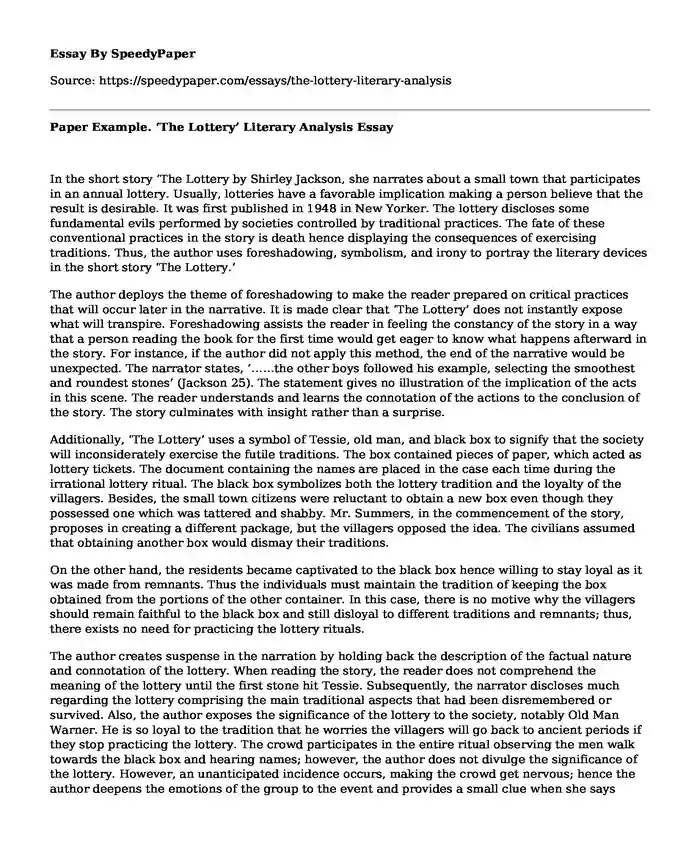
| Essay type: | Book review |
| Categories: | Analysis Shirley Jackson The Lottery Essays by wordcount |
| Pages: | 4 |
| Wordcount: | 855 words |
In the short story ‘The Lottery by Shirley Jackson, she narrates about a small town that participates in an annual lottery. Usually, lotteries have a favorable implication making a person believe that the result is desirable. It was first published in 1948 in New Yorker. The lottery discloses some fundamental evils performed by societies controlled by traditional practices. The fate of these conventional practices in the story is death hence displaying the consequences of exercising traditions. Thus, the author uses foreshadowing, symbolism, and irony to portray the literary devices in the short story ‘The Lottery.’
The author deploys the theme of foreshadowing to make the reader prepared on critical practices that will occur later in the narrative. It is made clear that ‘The Lottery’ does not instantly expose what will transpire. Foreshadowing assists the reader in feeling the constancy of the story in a way that a person reading the book for the first time would get eager to know what happens afterward in the story. For instance, if the author did not apply this method, the end of the narrative would be unexpected. The narrator states, ‘……the other boys followed his example, selecting the smoothest and roundest stones’ (Jackson 25). The statement gives no illustration of the implication of the acts in this scene. The reader understands and learns the connotation of the actions to the conclusion of the story. The story culminates with insight rather than a surprise.
Additionally, ‘The Lottery’ uses a symbol of Tessie, old man, and black box to signify that the society will inconsiderately exercise the futile traditions. The box contained pieces of paper, which acted as lottery tickets. The document containing the names are placed in the case each time during the irrational lottery ritual. The black box symbolizes both the lottery tradition and the loyalty of the villagers. Besides, the small town citizens were reluctant to obtain a new box even though they possessed one which was tattered and shabby. Mr. Summers, in the commencement of the story, proposes in creating a different package, but the villagers opposed the idea. The civilians assumed that obtaining another box would dismay their traditions.
On the other hand, the residents became captivated to the black box hence willing to stay loyal as it was made from remnants. Thus the individuals must maintain the tradition of keeping the box obtained from the portions of the other container. In this case, there is no motive why the villagers should remain faithful to the black box and still disloyal to different traditions and remnants; thus, there exists no need for practicing the lottery rituals.
The author creates suspense in the narration by holding back the description of the factual nature and connotation of the lottery. When reading the story, the reader does not comprehend the meaning of the lottery until the first stone hit Tessie. Subsequently, the narrator discloses much regarding the lottery comprising the main traditional aspects that had been disremembered or survived. Also, the author exposes the significance of the lottery to the society, notably Old Man Warner. He is so loyal to the tradition that he worries the villagers will go back to ancient periods if they stop practicing the lottery. The crowd participates in the entire ritual observing the men walk towards the black box and hearing names; however, the author does not divulge the significance of the lottery. However, an unanticipated incidence occurs, making the crowd get nervous; hence the author deepens the emotions of the group to the event and provides a small clue when she says ‘villages remembered to use stones’ (Jackson 26). The author does not disclose vital information until the stone hits Tessie. Therefore, holding back the information creates anxiety and builds a shocking deduction.
Moreover, the author applies various examples of dramatic irony to show the central concept of the story. Ironically, the lottery is conferred as an evil practice, yet the reader perceives it as a good thing. The author deploys this irony to reinforce the surprise and horror of the story hence withholding the reader from understanding the elementary concept of the narrative quickly. Also, two men discuss how a specific place has refused to practice the lottery, saying that they will want to return to stay in the caves. Thus, the story displays irony when the individuals who decline to participate in the lottery are termed as barbaric, yet the reader classifies villagers exercising the ritual as uncivilized.
In a nutshell, ‘The Lottery’ by Shirley Jackson mirrors modern life in a small town in America, enlightening the human ability for violence and justification of prejudices on cultural grounds. The author utilizes irony, symbolism, and foreshadowing to reveal the truths of confrontation and violence to transformation. The outcome of this tradition is that annually every person turns into a celebration to murder. The authors use an unfazed, and detached narrator to cover the component of horror to another level. Thus, the lottery is an excellent example of what can occur when traditions remain unaddressed and unquestioned critically by modern generations.
Work Cited
Jackson, Shirley. “The lottery.” The New Yorker 26 (1948): 25-28. https://www.newyorker.com/magazine/1948/06/26/the-lottery
Cite this page
Paper Example. 'The Lottery' Literary Analysis. (2023, Aug 02). Retrieved from https://speedypaper.com/essays/the-lottery-literary-analysis
Request Removal
If you are the original author of this essay and no longer wish to have it published on the SpeedyPaper website, please click below to request its removal:
- Racial Discrimination Essay Example
- Free Essay Example on Sex, Sexual Violence, and Pornography
- Remaining Competitive in the Market - Marketing Essay Example
- Essay Example on Marijuana, Cannabis Sativa
- Essay Sample with Article Summary on the Current Stand of American Politics
- Counting in Preschool - Teaching Essay Example
- Essay Sample on Interviewing Psychiatric Patients
Popular categories




